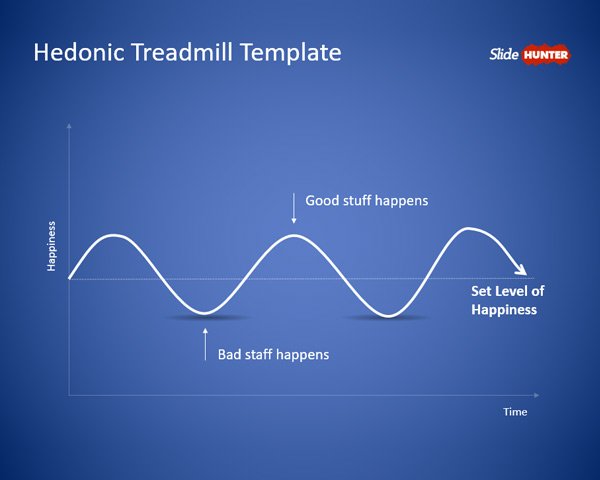
Hedonic adaptation accounts for our tendency to overestimate how happy pleasurable experiences will make us, and the fact that we tend to maintain a relatively stable level of happiness regardless of our material circumstances. The psychologists Brickman and Campbell began studying this phenomenon scientifically in the 1970s, calling it the Hedonic Treadmill. Hedonic adaptation is the observed psychological tendency to revert back to prior levels of happiness soon after experiencing something pleasurable. Refocusing your cognitive resources on the positive elements in your life may improve mindfulness, reduce symptoms of illness, increase feelings of purposefulness, and boost overall happiness.Have you ever felt like you would be so much happier as soon as you fulfilled some desire, only to end up unsatisfied soon afterwards? Why is it that getting something we want doesn't always make us consistently happy over the long term? What are we meant for? Merely the experience of pleasure, or something more profound? Instead of focusing on people who have more material goods than you, consider the less tangible blessings in your life, such as a loving partner, strong faith, meaningful volunteer work, or good health. Rather than idealizing a larger house or promotion at work as the key to your happiness, shift the way you think about success.Įach day, try to strengthen your interpersonal bonds with friends and family or perform a good deed for a stranger. Using the theory of the hedonic treadmill in your life allows you to refocus your goals to experience a higher level of happiness. While genetics and personality variables may largely explain your hedonic set point, your goals and attentional focus play a role in your day-to-day happiness. In other words, you don’t have to stay on the treadmill – you have some control to increase your happiness!


Research by positive psychologist Sonja Lyubomirsky indicates that 50% of your happiness is genetic, 10% is based on life circumstance, and 40% is in your control. However, understanding how the hedonic treadmill operates in your life can make you experience the world more positively. You now see that running on the hedonic treadmill is not necessarily good in and of itself, because it creates a situation in which you require more and more to feel happy. Just as you must keep working on a treadmill to stay in the same place, so must you continue to achieve more success, earn more money, or gain recognition to maintain your happiness set point. After several weeks or months, the newly-minted millionaire becomes accustomed to her new lifestyle and experiences a corresponding decrease in happiness. At first, the person is ecstatic to have become a millionaire overnight. Eventually, you return to the same level of happiness as you began at when you were an office-worker.Īnother common example of the hedonic treadmill occurs after an individual wins the lottery.

As time goes on, however, you find going to work each day less exciting and pleasurable. At first, you feel overwhelmingly happy and blessed to have become an entrepreneur and left your boring job behind. Finally, you quit your job, lease a retail space, and create the fun coffee shop of your dreams. You dream of changing careers and becoming the owner of a small coffee shop. Imagine that you are stuck at a job you dislike, performing monotonous work day after day. After good and bad events in your life, you eventually return to your set level of happiness.

When bad things happen, that level of happiness can dip down. When good things happen, that level of happiness can spike up. You essentially have a set level of happiness where you consistently remain. The hedonic treadmill is a theory that people return to a relatively stationary level of happiness, sometimes considered a happiness “set point.” Although efforts or interventions to improve happiness have a transient effect, individuals inevitably return to their original happiness set point after a short period of time.


 0 kommentar(er)
0 kommentar(er)
